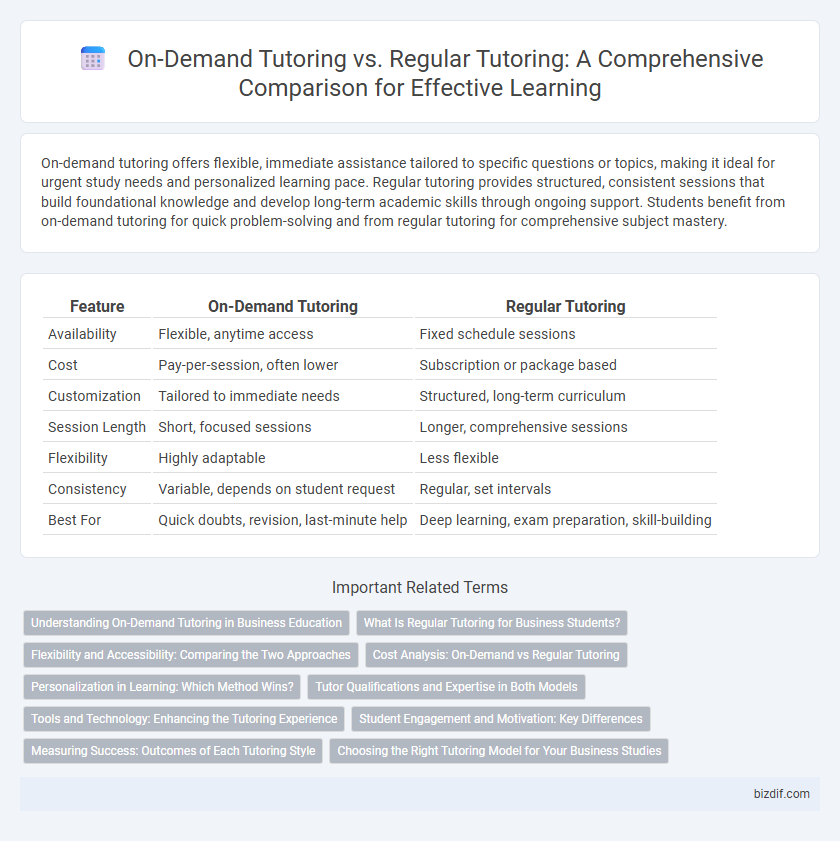On-demand tutoring offers flexible, immediate assistance tailored to specific questions or topics, making it ideal for urgent study needs and personalized learning pace. Regular tutoring provides structured, consistent sessions that build foundational knowledge and develop long-term academic skills through ongoing support. Students benefit from on-demand tutoring for quick problem-solving and from regular tutoring for comprehensive subject mastery.
Table of Comparison
| Feature | On-Demand Tutoring | Regular Tutoring |
|---|---|---|
| Availability | Flexible, anytime access | Fixed schedule sessions |
| Cost | Pay-per-session, often lower | Subscription or package based |
| Customization | Tailored to immediate needs | Structured, long-term curriculum |
| Session Length | Short, focused sessions | Longer, comprehensive sessions |
| Flexibility | Highly adaptable | Less flexible |
| Consistency | Variable, depends on student request | Regular, set intervals |
| Best For | Quick doubts, revision, last-minute help | Deep learning, exam preparation, skill-building |
Understanding On-Demand Tutoring in Business Education
On-demand tutoring in business education offers flexible, instant access to expert knowledge tailored to specific topics or challenges, enabling students to address learning gaps precisely when they arise. Unlike regular tutoring, which follows a fixed schedule, on-demand services leverage digital platforms and real-time interaction to accommodate dynamic learning needs and busy professional timetables. This model enhances personalized learning experiences by providing immediate, context-driven support crucial for mastering complex business concepts and applications.
What Is Regular Tutoring for Business Students?
Regular tutoring for business students involves scheduled, consistent sessions designed to reinforce fundamental concepts in finance, marketing, and management. This systematic approach helps build a strong foundation through personalized instruction tailored to the student's coursework and academic goals. Regular tutoring also facilitates ongoing assessment and progress tracking, ensuring continuous improvement and mastery of business subjects.
Flexibility and Accessibility: Comparing the Two Approaches
On-demand tutoring offers unparalleled flexibility by allowing students to access academic support exactly when needed, eliminating rigid scheduling constraints typical of regular tutoring sessions. This approach enhances accessibility for learners juggling varying commitments or those in remote locations without consistent access to tutoring centers. Regular tutoring provides structured consistency that fosters routine learning habits, but may lack the immediacy and adaptability found in on-demand services.
Cost Analysis: On-Demand vs Regular Tutoring
On-demand tutoring typically offers flexible pricing based on session length and frequency, often proving more cost-effective for students needing occasional help compared to regular tutoring with fixed weekly fees. Regular tutoring usually involves consistent payments regardless of session use, which can lead to higher overall expenses for students with irregular study needs. Evaluating hourly rates, cancellation policies, and the value of personalized progress tracking is crucial for a comprehensive cost analysis between on-demand and regular tutoring.
Personalization in Learning: Which Method Wins?
On-demand tutoring offers highly personalized learning by adapting to a student's immediate needs and pacing, ensuring targeted support and efficient problem-solving. Regular tutoring provides consistent, structured sessions that build foundational knowledge and track progress over time, allowing for long-term academic growth. Personalization in learning is enhanced in on-demand tutoring through tailored content delivery, but regular tutoring excels in maintaining systematic development and accountability.
Tutor Qualifications and Expertise in Both Models
On-demand tutoring often leverages highly specialized tutors available for immediate assistance, emphasizing quick expertise access across diverse subjects. Regular tutoring typically involves long-term engagement with tutors who possess verified qualifications and a deep understanding of the student's learning style. Both models prioritize certified educators, but regular tutoring allows for sustained skill development while on-demand focuses on targeted, subject-specific expertise.
Tools and Technology: Enhancing the Tutoring Experience
On-demand tutoring leverages adaptive learning platforms and AI-driven tools to provide instant access to personalized resources, enhancing flexibility and engagement. Regular tutoring often incorporates structured use of educational apps and digital whiteboards, fostering continuous skill development through scheduled sessions. Both methods benefit from video conferencing and interactive software, optimizing communication and real-time feedback for improved learning outcomes.
Student Engagement and Motivation: Key Differences
On-demand tutoring offers personalized, flexible sessions that boost student engagement by addressing immediate academic challenges, fostering intrinsic motivation through timely support. Regular tutoring provides structured, consistent learning schedules that build routine and accountability, helping maintain long-term motivation and steady progress. The key difference lies in adaptability versus consistency, with on-demand tutoring enhancing spontaneous engagement and regular tutoring promoting sustained commitment.
Measuring Success: Outcomes of Each Tutoring Style
On-demand tutoring offers flexible, personalized support that often leads to immediate problem-solving and increased student confidence, while regular tutoring fosters consistent progression through structured curricula and long-term skill development. Studies show that on-demand sessions boost short-term academic performance and engagement, whereas regular tutoring correlates with sustained improvement in standardized test scores and comprehensive subject mastery. Measuring success involves assessing both immediate knowledge retention from on-demand help and cumulative academic growth achieved through scheduled tutoring programs.
Choosing the Right Tutoring Model for Your Business Studies
On-demand tutoring provides flexible, immediate assistance tailored to specific business study challenges, making it ideal for students needing quick problem-solving support. Regular tutoring offers structured, consistent sessions that build foundational knowledge and improve long-term academic performance in business subjects. Selecting the right model depends on study goals, whether prioritizing convenience and quick help or sustained, in-depth learning for complex business concepts.
On-Demand Tutoring vs Regular Tutoring Infographic

 bizdif.com
bizdif.com